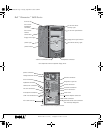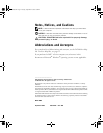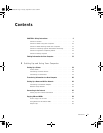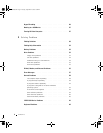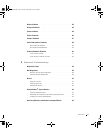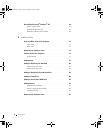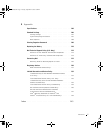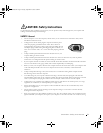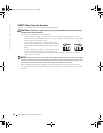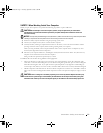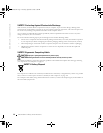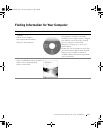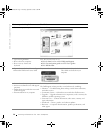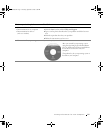
CAUTION: Safety Instructions 9
CAUTION: Safety Instructions
Use the following safety guidelines to help ensure your own personal safety and to help protect your computer and
working environment from potential damage.
SAFETY: General
• Do not attempt to service the computer yourself unless you are a trained service technician. Always follow
installation instructions closely.
• To help prevent electric shock, plug the computer and device power
cables into properly grounded electrical outlets. These cables are
equipped with 3-prong plugs to help ensure proper grounding. Do not
use adapter plugs or remove the grounding prong from a cable. If you
must use an extension cable, use a 3-wire cable with properly grounded
plugs.
• To help avoid the potential hazard of electric shock, do not use your
computer during an electrical storm.
• To help avoid the potential hazard of electric shock, do not connect or disconnect any cables or perform
maintenance or reconfiguration of this product during an electrical storm.
• If your computer includes a modem, the cable used with the modem should be manufactured with a minimum
wire size of 26 American wire gauge (AWG) and an FCC-compliant RJ-11 modular plug.
• Before you clean your computer, disconnect the computer from the electrical outlet. Clean your computer with
a soft cloth dampened with water. Do not use liquid or aerosol cleaners, which may contain flammable
substances.
• To help avoid possible damage to the system board, wait 5 seconds after turning off the computer before
disconnecting a device from the computer.
• To avoid shorting out your computer when disconnecting a network cable, first unplug the cable from the
network adapter on the back of your computer, and then from the network jack. When reconnecting a network
cable to your computer, first plug the cable into the network jack, and then into the network adapter.
• To help protect your computer from sudden, transient increases and decreases in electrical power, use a surge
suppressor, line conditioner, or uninterruptible power supply (UPS).
• Ensure that nothing rests on your computer’s cables and that the cables are not located where they can be
stepped on or tripped over.
• Do not push any objects into the openings of your computer. Doing so can cause fire or electric shock by
shorting out interior components.
• Keep your computer away from radiators and heat sources. Also, do not block cooling vents. Avoid placing loose
papers underneath your computer; do not place your computer in a closed-in wall unit or on a bed, sofa, or rug.
J2936bk0.book Page 9 Tuesday, September 2, 2003 3:06 PM



